This week we return to another intriguing moment in the life of Babur (1483-1530). He would go on to found the Mughal Empire in India, but at this point in his story he was fleeing from Uzbekistan to Afghanistan. He would soon claim a new kingdom, then have to make a perilous mountain crossing in the middle of an Afghan winter. That awful journey makes terrific inspiration for a trip through the mountains in your own RPG campaign! Plus, we’ll wrap up with an even worse mountain crossing by a former friend of Babur’s who did not live to see its end.
This is the third post in this monthly Babur series.
This post is brought to you by beloved Patreon backer Justin Moor. Thanks for helping keep the lights on! If you want to help keep this blog going alongside Justin, head over to the Patreon page – and thank you!
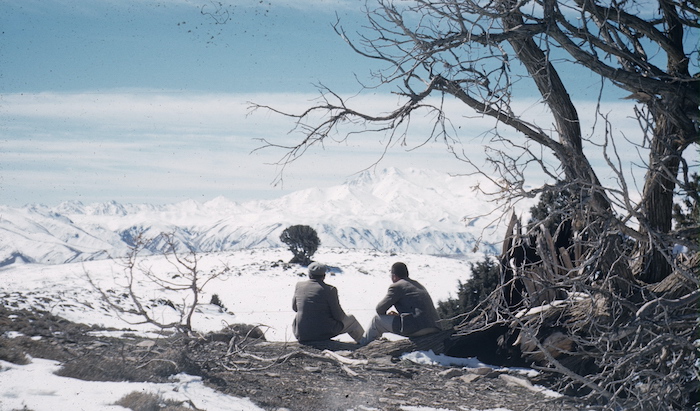
When last we saw Babur, he was without home, kingdom, or patron, fleeing from the armies of a very capable new player on the Central Asian stage: Shaybani, King of the Uzbeks. Babur would never return to his homeland. He entered the Hindu Kush mountains at the head of a column of 200 or 300 refugees. As other Timurid and Chagatai kingdoms fell to Shaybani, their soldiers fled south too. Many joined Babur on the strength of his reputation. Once, nearly the entire army of a despairing king deserted and joined Babur.
In 1504, at age 21, Babur reached Kabul, in what is today Afghanistan. He now had with him some 20,000 soldiers: the fleeing remnants of a half-dozen armies of kingdoms that no longer existed. Kabul was undergoing a succession crisis. The city’s new king was unpopular and seen as a usurper. When Babur showed up outside the city walls with a giant army, the king handed Kabul over to Babur and ran. With him went a cache of jewels and treasure that folks are still searching for today. But treasure or no, Babur was once again a king with a kingdom. His astonishing luck saved him again.
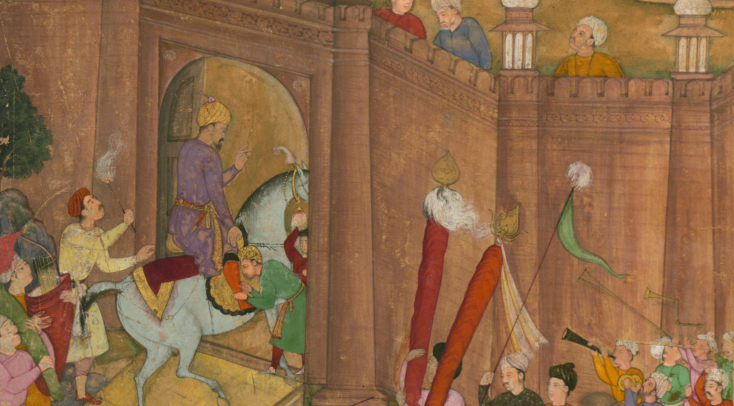
Afghanistan was no safe haven. Shaybani, King of the Uzbeks, took Balkh in northern Afghanistan. In Herat, western Afghanistan, the local Timurid king led an army out against Shaybani, but failed and died. Babur was going to join the King of Herat on this campaign, but got word of the disastrous battle before he’d traveled far from Kabul. Still, Babur decided to go to Herat anyway to meet with the late king’s sons. Maybe they could organize a united defense against Shaybani.
Instead, Babur found the Heratis useless. Herat was a crown jewel of Asia, a city overflowing with scholarship, poetry, art, and wine. This was thanks to Babur’s ancestor Timur, who’d repeatedly flattened Persia and forcibly relocated Persian high culture elsewhere, including to Herat. The city was incredible. Babur joked that you couldn’t stretch your legs there without kicking a poet. But the late king’s sons were creatures of the city in which they’d grown up. They were more concerned with pleasure and drinking parties than military affairs – or any practical affairs at all. They pressured Babur into staying the winter with them. He wanted to remain in their good graces so they’d work with him, so he agreed. But after a month in Herat, not only had the Heratis not made any plans against Shaybani, they hadn’t even found Babur and his retinue quarters in which to stay! So Babur made his excuses and left. Shaybani would take Herat next year.
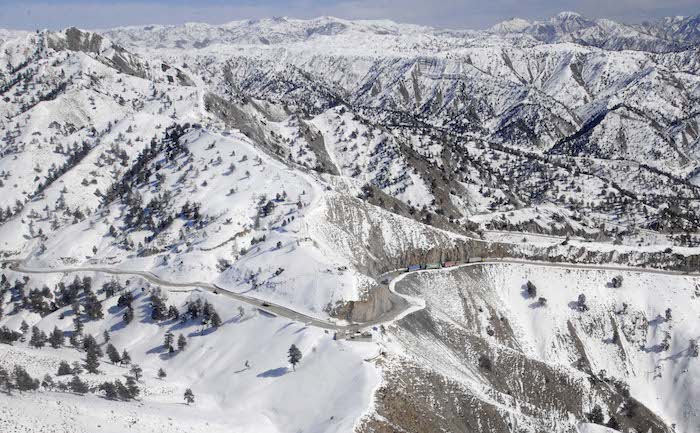
Now Babur had to get from Herat back to Kabul in the middle of an Afghan winter. The route passed over the Hindu Kush mountains, a spur of the Himalayas and a famously treacherous range. Babur had an old man with him as his guide. But not long after they entered the mountains, the old man admitted he didn’t recognize the route with the slopes all covered in snow. So Babur went looking for a guide from the only source available: the Hazaras.
If you follow the news out of Afghanistan, you’ve probably heard of the Hazaras. Today they’re a heavily-persecuted minority ethnic group. They’re mostly Shiite Muslims, unlike their Sunni neighbors. And they don’t look much like other Afghans. Historically, they grazed their herds in the high reaches of the Hindu Kush. Many are still mountain pastoralists today, while many others live in the cities, working bad jobs no one else wants.
Babur had little success bringing the Hazaras near Kabul under his rule. They governed themselves, refused to pay taxes, and sometimes waylaid travelers. As a consequence, most of Babur’s interactions with Hazaras had been of the ‘kill them and take their stuff’ variety. These expeditions had mixed results; often the Hazaras gave as good as they got. Maybe Babur would get lucky this time. Maybe none of the Hazaras near Herat had previously had bad run-ins with him near Kabul. But even if that were so, they likely still had relatives with grievances. And now Babur desperately needed a Hazara guide to get safely over the Hindu Kush.
So Babur sent 60 to 70 scouts back into the valley bottoms to look for Hazara families overwintering with their herds. They had no luck. Babur’s light on details, but I suspect that either the herdsmen heard the soldiers were coming and relocated, or they just refused to go with them. “What are you going to do, kidnap me? You want to cross the Hindu Kush under the guidance of someone who wants to see you dead?”
At your table, this is a great start to a journey through the mountains. Smart PCs will get a guide, but you need to make the guide useless. Is there anything worse for a fun story than a competent guide? “Don’t go that way, party of PCs. If you went that way, you might have a really interesting avalanche encounter, and I’m sure you wouldn’t want that.” Then present an option to get a new, better guide: but make it someone with a connection to someone the PCs wronged in the past. Maybe it’s the sister of the militia commander they insulted last week. Maybe it’s a former lover of a recurring villain. Make the PCs grovel to try to hire their services. Even if they succeed, they’ll always have to wonder if they’re about to be betrayed.
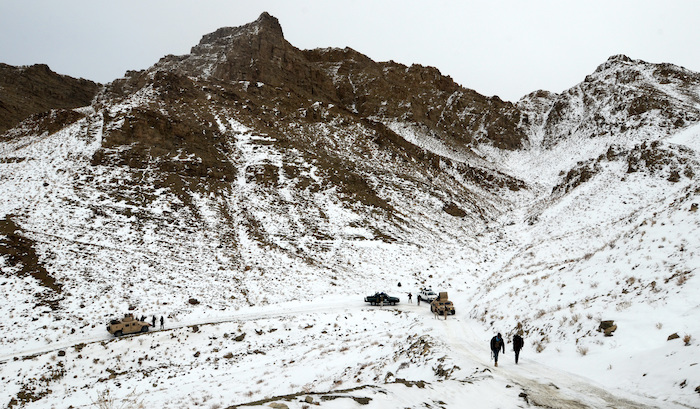
So Babur set out to cross the Hindu Kush without a guide. At first, the snow came up to the horses’ knees. Then their stirrups. Things got really bad when the snow was as high as the horses’ chests, because now the animals could make no forward progress at all. So fifteen men, Babur included, took turns stomping down the snow. Each would make five or ten yards of progress, sinking to his waist or chest on each step. When he was too tired to continue, someone else would pass him and break the trail. By the time these fifteen men had passed single-file through the snow, it was tamped down enough for a horse to walk through it. But horses are heavier than men. Even with this preparation, the lead horse still sank up to its stirrups, so the horses had to be rotated out when they got tired, just like the men. The rest of Babur’s retainers walked behind the horses. The party went on like this for a week.
At your table, this awful situation is the perfect time to ambush the party. Treat snow the horses have tamped down as normal terrain. Make it cost double movement points to go through the snow only tamped down by men – and quadruple through un-stomped snow. Make the party’s attackers only half as impacted by snow as the PCs. If they’re humanoid, they’re on skis or snowshoes. If they’re monsters, they’ve got big paws like polar bears or lynxes.

Once Babur’s party was caught in a blizzard so severe the men feared for their lives. They reached a cave where they could hunker down out of the wind. But the party was so spaced out along the single-file path they’d made – and so slow with exhaustion and frostbite – that it took well over an hour before everyone was inside. Babur sat in the snow outside the cave, unwilling to enter until all his people were safely in. When he got up and entered after the last man, the snow had piled atop his hat to the height of four handspans. Some of his retainers lost hands and feet to frostbite before they made it out of the mountains.
At your table, everyone being trapped in a cave by a snowstorm is a great opportunity. If there’s a bunch of NPCs in the cave too, one of them can get killed and you’ve got a cool murder mystery. If there’s a vision, a spectral visitation, or a comms hail you’ve been meaning to throw at the party, now’s a great time. No distractions! And if you’re fortunate enough to have a bunch of players who just enjoy roleplaying with one another, this cave’s a great place for it. They’ve got something to start talking about (“We almost died out there!”) and no deadline on when they have to stop.
Babur’s party eventually made it out of the mountains and back to Kabul.

I’d like to close with another story. It feels like a tangent, but it ties in well with the one above. Back in Kabul, Baqi Chaghaniani, one of Babur’s closest advisors from his refugee days, was acting up. Babur complained that he gave Baqi all the honor and wealth he asked for, but Baqi was ungrateful. He hid the money he earned from his positions, rather than passing part of it along to King Babur. He claimed insult when none was offered. And he started doing the aristocratic version of that insecure boyfriend thing where you pretend to break up with someone so they beg you to stay. Baqi would come to Babur and ask to be released from his service. Then Babur would have to say something like “But you are my most trusted lieutenant. How could I release you? You’re too important to let go.” This publicly inflated Baqi’s importance at the cost of being very annoying to Babur.
Eventually, Babur got sick of it and when Baqi asked again to be released, Babur agreed and let him go. This was not what Baqi intended! Now it was Baqi begging Babur to take him back. It didn’t work. Since Baqi was no longer in Babur’s service, he had to leave Kabul. Most of the soldiers attached to Baqi left his service and found others among Babur’s court to attach themselves to. So Baqi, his family, and his few remaining retainers reluctantly left Kabul. Their route was east through the Khyber Pass. This is an ancient and famous gap, one of very few between what is today Afghanistan and Pakistan. Even today, the Khyber Pass (technically the Torkham Gate) is one of the two primary border crossings between the two states. Consequently the Khyber Pass is a money-maker for whoever controls it.
At that time the Khyber Pass was controlled by a minor aristocrat named Yar-i-Husain. He had been a third-string subordinate of Babur’s: the sort of person who operates far away from you and pays you lip service because it’s easier for both of you if you can pretend you’re on the same side. In the past year, Yar-i-Husain had recruited a bunch of local tribesmen and started collecting tolls on the traffic through the pass. When he heard that Baqi Chaghaniani was disgraced and heading towards Khyber with little escort, Yar-i-Husain killed Baqi, took his stuff, forcibly married his wife, and may have sold the rest of Baqi’s retinue into slavery. Babur viewed all this as an appropriate outcome for Baqi’s annoying behavior.
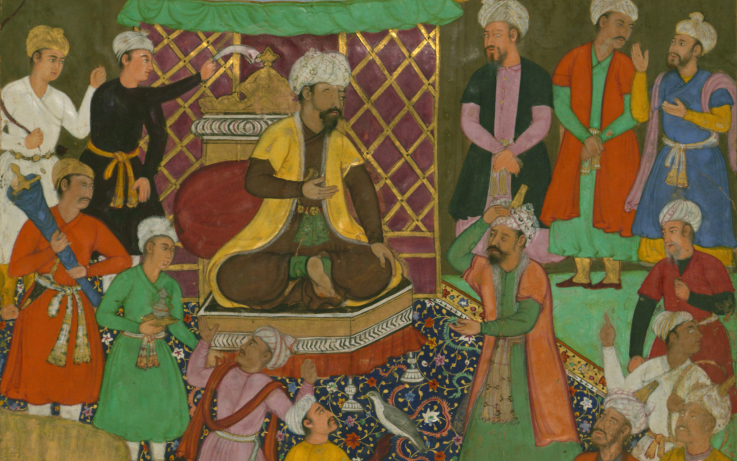
At your table, a fictional departure modeled on Baqi’s is an interesting adventure hook. You have someone important who accidentally banished themselves while carrying too much money and not enough protection. Maybe your fictional Baqi-analogue approaches the PCs to act as his escort. Is it worth taking the payout to help him even if it means angering the ruler who kicked him out? Might the PCs decide they should be the ones to rob him? Or you could even have this be an encounter the party stumbles into while traveling. They see a gang of bandits attacking a tiny noble retinue, recognize your Baqi-analogue from his heraldry (or other signifiers), and know what’s probably going on. Do they get involved? If so, which side do they help?
Furthermore, let’s tie it back into the business with the deep snow earlier in this post. Deep snow like that could be a really fun complication to this fight. And if you’re looking for a good antagonist to use in a deep snow fight of your own, Yar-i-Husain makes a good one: a petty aristocrat not much different from a common bandit, but with deep roots in the community.
This part of the story ends with Babur firmly in control of Kabul. Right when it looked like Shaybani, King of the Uzbeks, was going to gobble up the rest of Afghanistan (and Babur with it), he was stopped by a resurgent Persia. The new Savafid dynasty attacked Shaybani and killed him. The Shah had Shaybani’s skull coated in gold and turned into a goblet.
Babur’s homeland was still in Uzbek hands, so he couldn’t return (though he tried!). He required instead a different outlet for his ambitions. But that’s a story for next month. Until then, come on back for more of my regular weekly content!

Work continues on my next book: Ballad Hunters, a TTRPG about collecting magical folk ballads in 1813 England and Scotland. The songs of the common people are coming to life and spreading grief, betrayal, and murder! Play as folklorists employed as agents of the government, sing historical ballads with your friends, and overcome the perils hidden in these wonderful old folk songs.
My source material – the 19th-century collection compiled by Francis James Child – lists 305 distinct ballads, but Child provides numerous variants to almost all of them. So I’m going through well over a thousand songs to take notes and rate each for its utility at the gaming table. I’m more than half done. It’s going to be a while before this phase of the work is complete, but it’s really important! Because each song’s lyrics lie at the heart of the Ballad Hunters experience, I have to make sure the gameplay is tailored to the songs. You don’t want to spend time building a fun gameplay loop only to learn it doesn’t fit most of the ballads.
Fortunately, the Child ballads are much better suited to the gaming table than sea shanties were in Shanty Hunters. I had to go through a lot of shanties to find the seventeen gameable ones I included in that RPG. Among the Child ballads, I’m finding about one in four of the 305 unique ballads has a variant that would be fun at the gaming table. That suggests I’m going to be spoiled for choice when it comes to assembling the book. That’ll mean a better book, a stronger game, and more fun at the table!

Come follow and chat with me on social media! On Twitter, I’m @moltensulfur. On Facebook, I’m Molten Sulfur Press.






